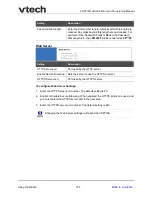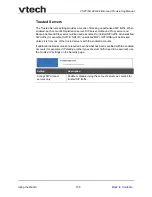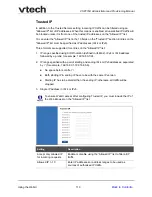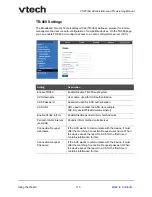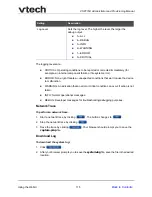
Provisioning Using Configuration Files
117
VSP716A Administrator and Provisioning Manual
The Provisioning Process
The automatic provisioning process is as follows:
1. Check for new or updated configuration files. For file-checking options, see
“Resynchronization: configuration file checking” on
. The VSP716A maintains a list of the last loaded provisioning files. The
VSP716A compares its current configuration against the files it finds on the
provisioning server.
Checking for update…
appears on the VSP716A screen.
If provisioning has been triggered by the resync timer expiring or by remote
check-sync, the VSP716A checks for updated files after one minute of inactivity.
2. Download the configuration files.
If any file on the provisioning server has changed, the VSP716A treats it as a new file
and downloads it.
Configuring Deskset…
appears on the VSP716A screen.
If the provisioning URL specifies a path only with no filename (if the URL ends with “/”),
then by default the VSP716A looks for and retrieves the following two files by
appending the two default filenames to the URL:
General file:
<model>.cfg
.
MAC-specific file:
<model>_<MAC Address>.cfg
.
The <model> variable is the VTech product model: VSP716A, for example.
If the provisioning URL contains a query element (?), or a filename ending in “.cfg” is
specified at the end of the provided URL path, then the VSP716A retrieves only the
configuration file specified.
3. The VSP716A restarts after one minute of inactivity.
Please wait while the phone
reboots
appears on the VSP716A screen. For more information, see
.
During provisioning, the VSP716A reads the configuration file and validates each module
and setting. The VSP716A considers a setting valid if it is:
a valid data type
formatted as a valid setting
within a valid data range
part of a module that passes an integrity check. That is, the module's settings are
consistent and logical. For example, in the "network" module, if DHCP is disabled,
but no static IP address is specified, the module will fail the integrity check and
none of the settings will apply.
Invalid modules or invalid settings are skipped and logged as ERROR messages in the
system log, but will not interrupt the provisioning process. The system log will include the
module parameters that have not been applied. A recognised module with unrecognised
settings will cause all other settings in that module to be skipped.






